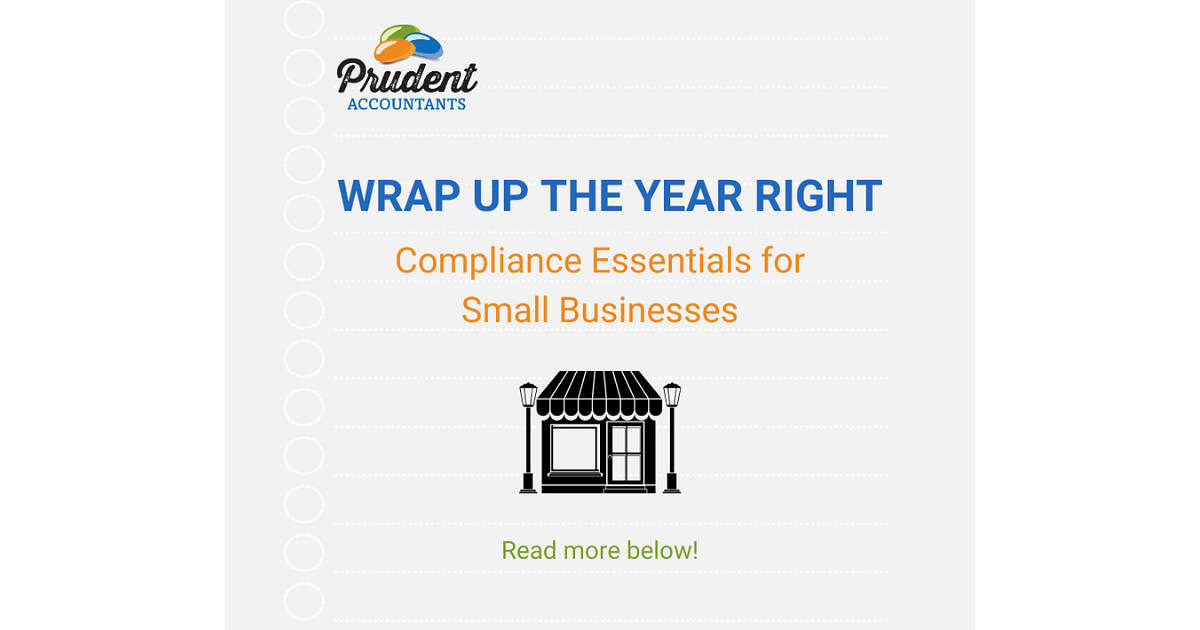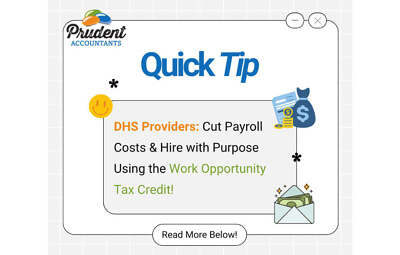Year-End Compliance Checklist for Small Businesses

As the end of the year approaches, it’s crucial for small businesses to ensure compliance with various local, state, and federal requirements. This checklist is organized by specific areas such as federal and state taxes, employment compliance, registrations, and more. By following this guide, you can avoid penalties, streamline operations, and set your business up for a successful new year.
1. Federal Income Tax Compliance
- File Estimated Tax Payments: Ensure all estimated federal tax payments are up to date. The final quarterly payment for the year is due on January 15th, so plan accordingly to avoid penalties.
- Review Year-End Tax Deductions: Analyze financial records for potential deductions, such as business expenses, charitable contributions, and retirement plan contributions.
- Gather and Organize Receipts and Documentation: Collect and categorize all receipts, invoices, and other documents related to income and expenses to prepare for tax filing.
- Schedule a Meeting with Your Tax Advisor: Review your tax situation and plan for any last-minute tax-saving strategies with your accountant or tax advisor.
- Prepare for New Year Tax Forms: Ensure readiness to prepare and distribute W-2 forms for employees, 1099-NEC forms for contractors, and any other required federal tax forms by the January 31 deadline.
2. MN State Income Tax Compliance
- File MN Estimated Tax Payments: Confirm all Minnesota estimated tax payments are made on time. The fourth quarterly payment is due on January 15th. Make sure to plan for this payment to avoid penalties.
- Review MN PTE Tax Compliance: If your business is subject to the Minnesota Pass-Through Entity (PTE) tax, review filing requirements, and ensure all necessary payments and filings are completed before year-end.
- Plan for State Tax Deductions: Check for any state-specific deductions or credits that may apply, such as those related to charitable contributions or certain business expenses.
3. MN Sales Tax Compliance
- Review Sales Tax Filings: Confirm all Minnesota sales tax returns are filed accurately and on time. Ensure all sales and use taxes collected have been reported and remitted to the state.
- Conduct a Sales Tax Nexus Review: Evaluate whether your business activities create a sales tax nexus in other states, and ensure compliance with any additional sales tax obligations.
4. Federal and MN Employment Compliance
- Verify Employee Information: Ensure all employee details, including addresses, Social Security numbers, and tax withholdings, are current and accurate for both federal and state requirements.
- Review Payroll Records: Confirm payroll records are complete and accurate for the year. Ensure all federal and state taxes have been withheld and remitted correctly.
- Check Employee Benefits and Retirement Contributions: Verify that all employee benefits and retirement contributions, such as 401(k) or SEP IRA plans, are accurately recorded and funded.
- Distribute Year-End Notices: Provide employees with any required year-end notices, including ACA healthcare notices, retirement plan information, and any Minnesota state-mandated notifications.
- Prepare for Year-End Payroll Processing: Plan for finalizing payroll, including bonuses, unused PTO payouts, and preparing W-2s and other necessary forms.
5. MN Secretary of State Compliance
- File Annual Reports: Confirm that all required annual reports or statements of information are filed with the Minnesota Secretary of State.
- Update Registered Agent Information: Ensure any changes to your business’s registered agent or office address are updated with the Minnesota Secretary of State to receive all legal notices.
6. Real Estate Tax Compliance
- Review Real Estate Valuations: Assess the real estate valuations provided by local governments, as these valuations will determine property taxes. Verify the accuracy of the valuations and, if needed, file an appeal if you believe the valuation is incorrect.
- Prepare for Property Tax Payments: Make sure you have sufficient funds set aside for property tax payments based on the latest valuations and understand the deadlines and payment options for your local jurisdiction.
7. Renewal of Business Licenses and Permits
- Review Business Licenses and Permits: Verify that all business licenses, permits, and registrations are current, and renew any that are expiring soon. This includes any local, state, and federal registrations.
- Check Industry-Specific Compliance: Ensure compliance with any industry-specific regulations, such as health department permits, professional licenses, or certifications that may need renewal.
8. Bank Compliance on Debt Service and Property Improvement
- Reconcile Bank Accounts: Perform a thorough reconciliation of all business bank accounts to ensure that all transactions are accurately recorded and any discrepancies are resolved.
- Review Debt Service Obligations: Review all loan agreements to ensure compliance with debt service requirements, including timely payments and maintaining required financial ratios.
- Plan for Property Improvement and Maintenance: Evaluate any necessary property improvements or maintenance and ensure they are planned and budgeted accordingly, particularly if they may impact your compliance with loan covenants.
- Review Cash Flow and Reserve Levels: Assess your cash flow situation to ensure you have sufficient reserves to cover any year-end expenses, such as taxes, bonuses, and other liabilities.
9. Business Planning and Budgeting for the Next Year
- Review Current Year Performance: Evaluate your business’s financial performance over the past year, including revenue, expenses, profits, and losses. Identify areas for improvement and growth opportunities.
- Set Financial Goals and Budget for the New Year: Develop a budget for the upcoming year, including projected income, expenses, cash flow, and any anticipated capital expenditures. Set financial goals for sales, profit margins, and cost management.
- Plan for Major Investments or Changes: Consider any significant investments, such as new equipment, technology, or expansions, that may impact your budget. Assess the potential ROI and tax implications of these investments.
- Update Business Plan: Update your business plan to reflect changes in your market, products or services, or business model. Ensure your plan aligns with your new goals and strategies.
- Review Your Business Insurance: Evaluate your current business insurance policies to ensure they provide adequate coverage. Make any necessary adjustments based on changes in your business operations or assets.
- Schedule Planning Meetings: Set up meetings with your management team, accountant, or financial advisor to review your budget, financial goals, and strategies for the upcoming year.
10. Estimated Tax Return for 2024
- Run Estimated Personal and Business Tax Returns: Perform estimated tax calculations for both your personal and business finances in October or November. This will give you a clear picture of your potential tax liability, allowing you to plan for any tax payments and make strategic financial decisions, such as accelerating expenses, maximizing deductions, or contributing to retirement accounts.
- Adjust Withholdings or Estimated Payments: Based on the estimated tax return results, adjust your withholdings or make additional estimated tax payments if necessary to avoid underpayment penalties.
By using this detailed checklist, your small business will stay compliant with all local, state, and federal regulations while preparing for a successful new year. Taking these proactive steps will help you avoid penalties, ensure smooth operations, and position your business for growth and success in the coming year.
Recent Post
View all Post
If you run a home health agency, daycare, or assisted living business, you know your biggest…
Many small business owners pay for business expenses out of their own pocket—because it’s faster, easier,…
You finally caught a break—your lender forgave part (or all) of your business debt. But now…
Recent changes to U.S. trade policy are once again shifting the financial ground for small businesses—especially…
When you hear “research and development tax credit,” you might picture scientists in lab coats or…
Homeowners across Minnesota have long aired frustrations over aggressive homeowners association (HOA) boards—associations levying arbitrary fines,…








